| Srl | Item |
| 1 |
ID:
166094


|
|
|
|
|
| Summary/Abstract |
The 2018 constitutional amendments in China have attracted strong criticism both at home and abroad. This paper first uses contextual, historical, and empirical analysis to examine whether the three major amendments are as bad as widely perceived, and whether or not they will have a significant impact on actual constitutional practice in China. The paper then analyses how the constitutional amendments may challenge the two existing theories on Chinese constitutionalism. The paper argues that although none of the constitutional amendments will have any practical importance, they do send out a very negative signal, and that the trend of a constitutionalised fused system demands at least revision of the existing theories and possibly a new theory, for the purpose of not only justifying Chinese constitutional practice but also leading China towards at least a thin rule of law.
|
|
|
|
|
|
|
|
|
|
|
|
|
|
|
|
| 2 |
ID:
095668
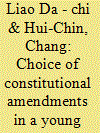

|
|
|
|
|
| Publication |
2010.
|
| Summary/Abstract |
This paper attempts to determine the kind of constitutional rule preferred in a young democracy when an institutional opportunity for constitutional change occurs. It adopts the standpoint of collective decision-making. This approach involves two crucial theoretical elements: the calculation of the interests of the political elite and the masses' comprehension of what democracy is. The case studied here is Taiwan's constitutional choice between the direct and indirect election of the president during the period from 1990 to 1994. The paper first examines how the political leaders might have used both the logic of power maximization and of power-loss minimization to choose their position on the issue. It then demonstrates that survey results indeed showed that respondents better understood the direct form of electing the president and therefore supported it over the indirect one. This support helped the direct form to eventually win out.
|
|
|
|
|
|
|
|
|
|
|
|
|
|
|
|
| 3 |
ID:
174817
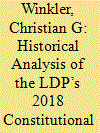

|
|
|
|
|
| Summary/Abstract |
In 2018 Japan’s Liberal Democratic Party announced four new proposals to amend the seven-decades-old and thus-far unamended constitution of Japan. These include adding a third paragraph to Article 9, as well as state-of-emergency provisions, support for students in need, and changes to the electoral system. By analyzing each proposal’s place in the debate on amendments dating back to the 1950s, I show that these very different proposals share one important feature that sets them apart from recent drafts aiming for wholesale reform of the constitution: they are relatively minimalist in nature. This new modesty is due to the necessity to win over other parties and voters, but it is also an attempt to cement rather than to change the LDP-made status quo.
|
|
|
|
|
|
|
|
|
|
|
|
|
|
|
|
| 4 |
ID:
184425
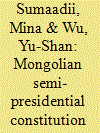

|
|
|
|
|
| Summary/Abstract |
While earlier studies of Mongolian democracy focused on actor-based explanations for its success, this study discusses the previously less examined role of Mongolia’s semi-presidential constitution in the process of democratization. It examines how the semi-presidential political system in Mongolia evolved since 1992 and offers an in-depth examination of the Mongolian semi-presidential form of government institutionalized by the 1992 constitution and its subsequent amendments. Based on this, it also addresses the question of whether the Mongolian semi-presidential constitution was a weakness or a strength to democratization. This study argues that at an early stage when the political forces were learning the rules of the game, the constitution was an overall positive influence on democratization. Moreover, the main weaknesses linked to the constitutional design were more likely to be related to weak institutional control mechanisms that could be resolved at a lower level legal framework.
|
|
|
|
|
|
|
|
|
|
|
|
|
|
|
|
| 5 |
ID:
128134
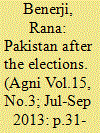

|
|
|
|
|
| Publication |
2013.
|
| Summary/Abstract |
The successful holding of elections in Pakistan on May 11, 2013 was a significant landmark in strengthening the democratic process in Pakistan. For the first time, an elected government lasted its full terms. A transition could be brought in by caretakers entrusted responsibility through a path braking constitutional amendment.
|
|
|
|
|
|
|
|
|
|
|
|
|
|
|
|
| 6 |
ID:
145452
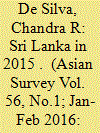

|
|
|
|
|
| Summary/Abstract |
The year 2015 in Sri Lanka was characterized by a democratic transfer of power from the United People’s Freedom Alliance, led by President Mahinda Rajapaksa, to a coalition led by the United National Party. Constitutional changes restricting presidential power, and the growth of a new approach to human rights and ethnic reconciliation, accompanied this shift. Sri Lanka’s emphasis in its economic policy shifted from major infrastructural projects to a further strengthening of human capacities.
|
|
|
|
|
|
|
|
|
|
|
|
|
|
|
|
| 7 |
ID:
086694
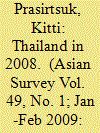

|
|
|
|
|
| Publication |
2009.
|
| Summary/Abstract |
Thailand was bombarded by multiple crises in 2008. The political crisis became more acute as the divisiveness among people ran deep and escalated to violence. The situation remains unresolved. Insurgency in the South continues, while territorial conflicts with Cambodia have also erupted.
|
|
|
|
|
|
|
|
|
|
|
|
|
|
|
|
| 8 |
ID:
119515


|
|
|